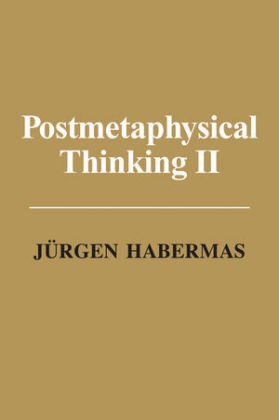Read more
'There is no alternative to postmetaphysical thinking': this statement, made by Jürgen Habermas in 1988, has lost none of its relevance. Postmetaphysical thinking is, in the first place, the historical answer to the crisis of metaphysics following Hegel, when the central metaphysical figures of thought began to totter under the pressure exerted by social developments and by developments within science. As a result, philosophy's epistemological privilege was shaken to its core, its basic concepts were de-transcendentalized, and the primacy of theory over practice was opened to question. For good reasons, philosophy 'lost its extraordinary status', but as a result it also courted new problems. In Postmetaphysical Thinking II, the sequel to the 1988 volume that bears the same title (English translation, Polity 1992), Habermas addresses some of these problems.
The first section of the book deals with the shift in perspective from metaphysical worldviews to the lifeworld, the unarticulated meanings and assumptions that accompany everyday thought and action in the mode of 'background knowledge'. Habermas analyses the lifeworld as a 'space of reasons' - even where language is not (yet) involved, such as, for example, in gestural communication and rituals. In the second section, the uneasy relationship between religion and postmetaphysical thinking takes centre stage. Habermas picks up where he left off in 1988, when he made the far-sighted observation that 'philosophy, even in its postmetaphysical form, will be able neither to replace nor to repress religion', and explores philosophy's new-found interest in religion, among other topics. The final section includes essays on the role of religion in the political context of a post-secular, liberal society.
This volume will be of great interest to students and scholars in philosophy, religion and the social sciences and humanities generally.
List of contents
Contents
Linguistification of the Sacred. In Place of a Preface
I The Lifeworld as a Space of Reasons
1. From Worldviews to the Lifeworld
2. The Lifeworld as a Space of Symbolically Embodied Reasons
3. A Hypothesis concerning the Evolutionary Meaning of Rites
II Postmetaphysical Thinking
4. The New Philosophical Interest in Religion. An Conversation with Eduardo Mendieta
5. Religion and Postmetaphysical Thinking: A Reply
6. A Symposium on Faith and Knowledge: Reply to Objections, Response to Suggestions
III Politics and Religion
7. 'The Political': The Rational Meaning of a Questionable Inheritance of Political Theology
8. The 'Good Life' ? a 'Detestable Phrase': The Significance of the Young Rawls's Religious Ethics for His Political Theory
9. Rawls's Political Liberalism: Reply to the Resumption of a Discussion
10. Religion in the Public Sphere of 'Post-Secular' Society
Sources of the Texts
Notes
Index
About the author
Jürgen Habermas is Emeritus Professor of Philosophy at the Johann Wolfgang Goethe University of Frankfurt and one of the most influential social and political thinkers in the world today.
Summary
There is no alternative to postmetaphysical thinking : this statement, made by Jurgen Habermas in 1988, has lost none of its relevance.
Report
"This new volume is a remarkable example of a lifework that is still very much a work in progress. It covers a rich variety of topics, honing in particularly on the meaning of religion in public life."
Die Zeit

